冀教版七年级下册英语 2 Meet You in Beijing 教案
文档属性
| 名称 | 冀教版七年级下册英语 2 Meet You in Beijing 教案 |
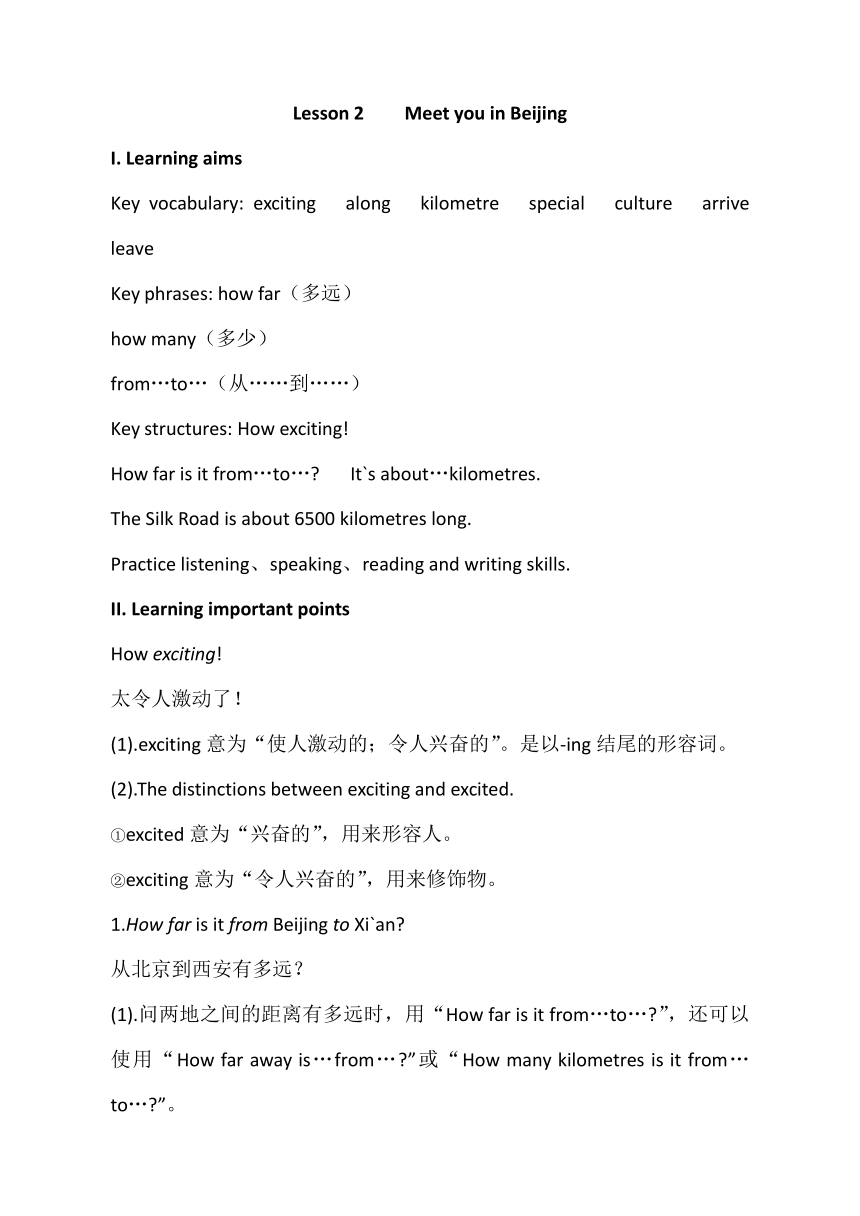
|
|
| 格式 | doc | ||
| 文件大小 | 72.5KB | ||
| 资源类型 | 教案 | ||
| 版本资源 | 冀教版 | ||
| 科目 | 英语 | ||
| 更新时间 | 2021-06-09 13:55:24 | ||
图片预览

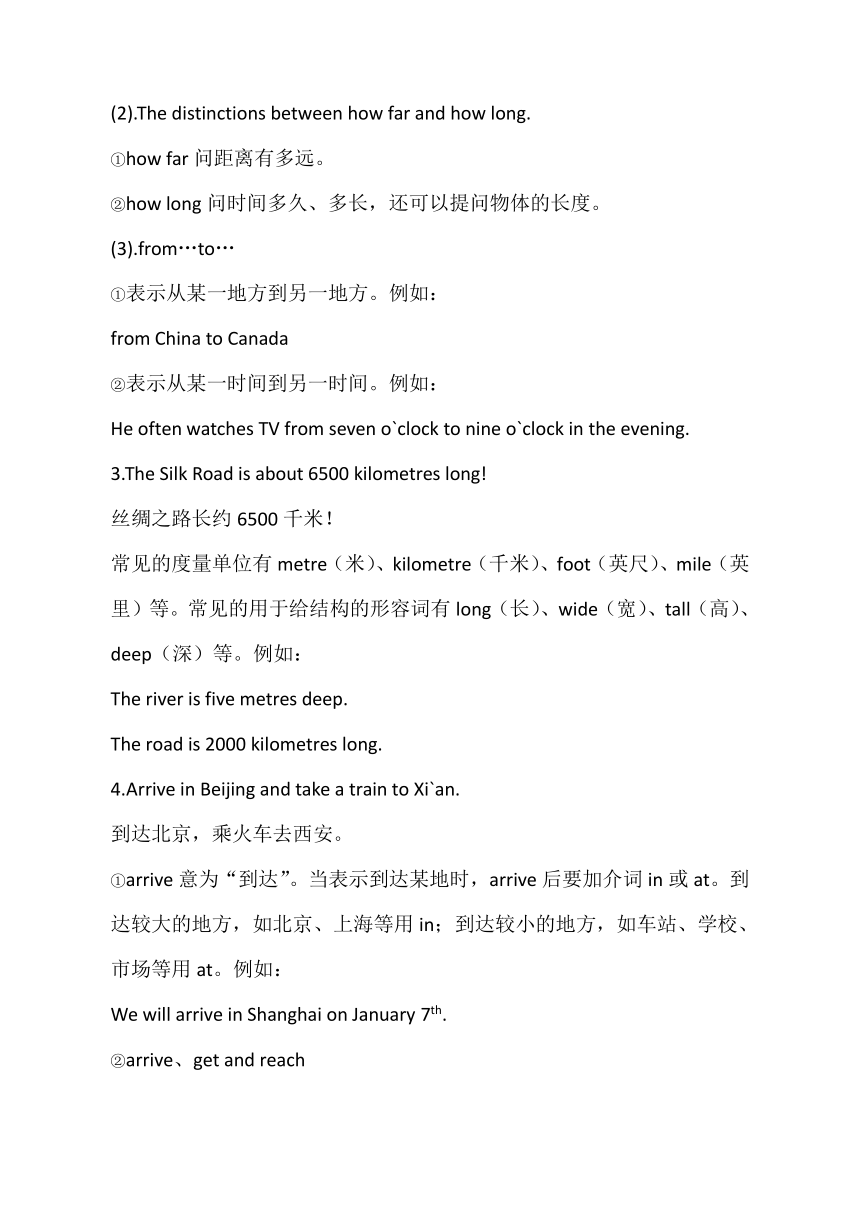
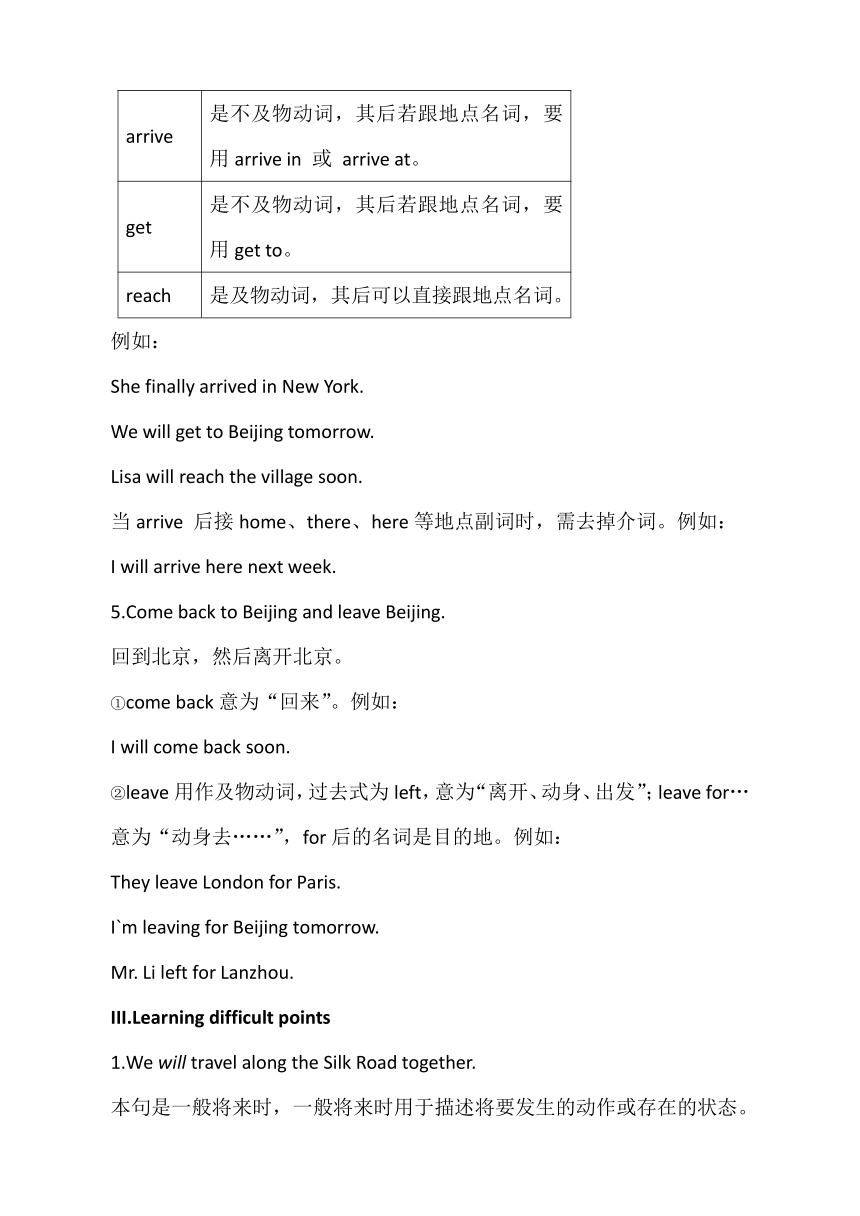
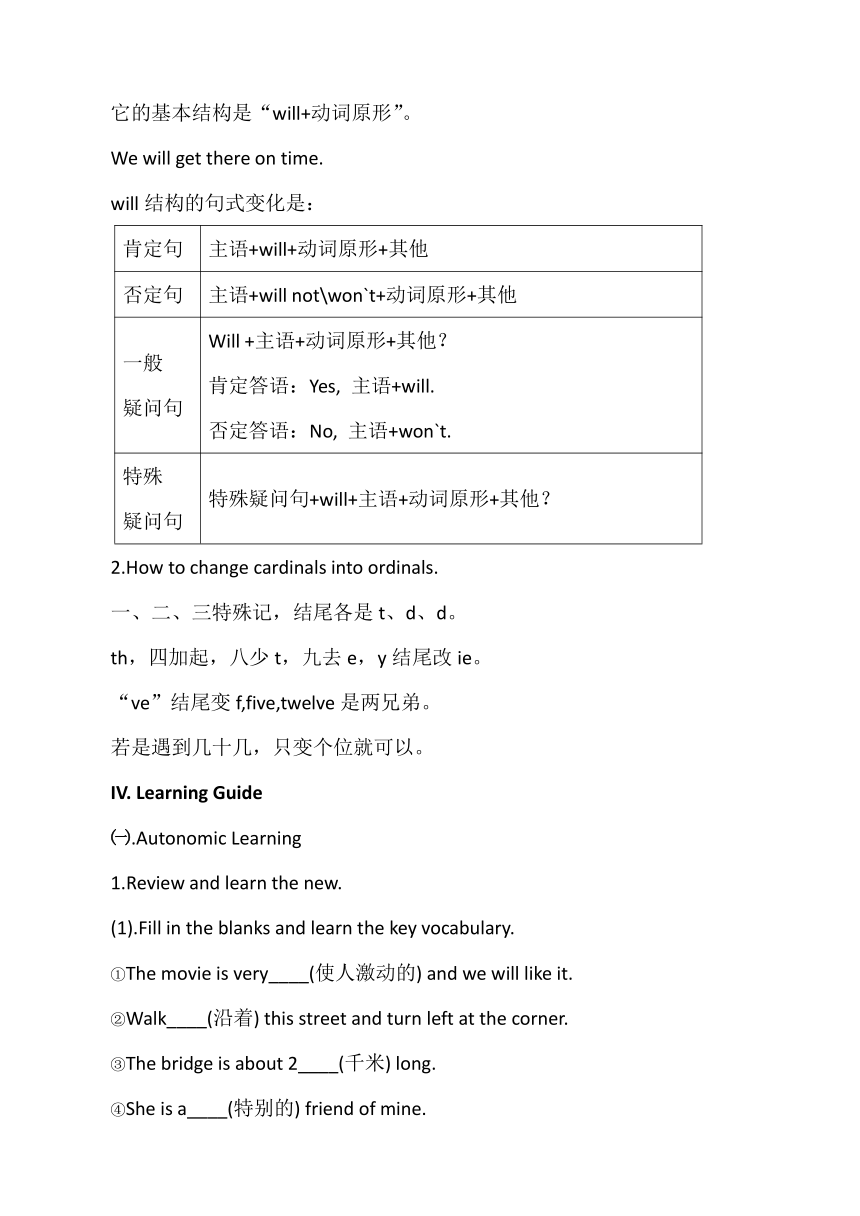
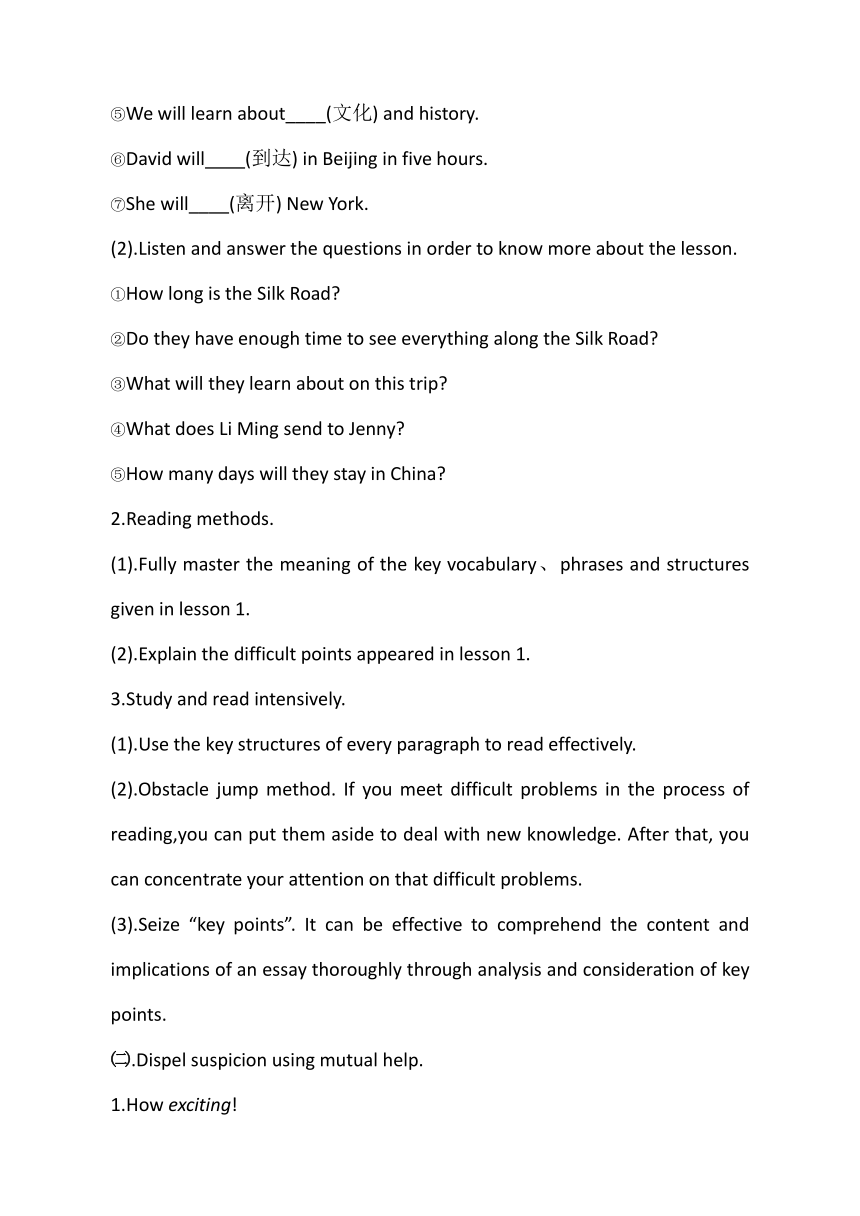
文档简介
Lesson 2 Meet you in Beijing
I. Learning aims
Key vocabulary: exciting along kilometre special culture arrive leave
Key phrases: how far(多远)
how many(多少)
from…to…(从……到……)
Key structures: How exciting!
How far is it from…to…? It`s about…kilometres.
The Silk Road is about 6500 kilometres long.
Practice listening、speaking、reading and writing skills.
II. Learning important points
How exciting!
太令人激动了!
.exciting意为“使人激动的;令人兴奋的”。是以-ing结尾的形容词。
(2).The distinctions between exciting and excited.
①excited意为“兴奋的”,用来形容人。
②exciting意为“令人兴奋的”,用来修饰物。
How far is it from Beijing to Xi`an?
从北京到西安有多远?
.问两地之间的距离有多远时,用“How far is it from…to…?”,还可以使用“How far away is…from…?”或“How many kilometres is it from…to…?”。
.The distinctions between how far and how long.
①how far问距离有多远。
②how long问时间多久、多长,还可以提问物体的长度。
(3).from…to…
①表示从某一地方到另一地方。例如:
from China to Canada
②表示从某一时间到另一时间。例如:
He often watches TV from seven o`clock to nine o`clock in the evening.
3.The Silk Road is about 6500 kilometres long!
丝绸之路长约6500千米!
常见的度量单位有metre(米)、kilometre(千米)、foot(英尺)、mile(英里)等。常见的用于给结构的形容词有long(长)、wide(宽)、tall(高)、deep(深)等。例如:
The river is five metres deep.
The road is 2000 kilometres long.
4.Arrive in Beijing and take a train to Xi`an.
到达北京,乘火车去西安。
①arrive意为“到达”。当表示到达某地时,arrive后要加介词in或at。到达较大的地方,如北京、上海等用in;到达较小的地方,如车站、学校、市场等用at。例如:
We will arrive in Shanghai on January 7th.
②arrive、get and reach
arrive 是不及物动词,其后若跟地点名词,要用arrive in 或 arrive at。
get 是不及物动词,其后若跟地点名词,要用get to。
reach 是及物动词,其后可以直接跟地点名词。
例如:
She finally arrived in New York.
We will get to Beijing tomorrow.
Lisa will reach the village soon.
当arrive 后接home、there、here等地点副词时,需去掉介词。例如:
I will arrive here next week.
5.Come back to Beijing and leave Beijing.
回到北京,然后离开北京。
①come back意为“回来”。例如:
I will come back soon.
②leave用作及物动词,过去式为left,意为“离开、动身、出发”;leave for…意为“动身去……”,for后的名词是目的地。例如:
They leave London for Paris.
I`m leaving for Beijing tomorrow.
Mr. Li left for Lanzhou.
III.Learning difficult points
We will travel along the Silk Road together.
本句是一般将来时,一般将来时用于描述将要发生的动作或存在的状态。它的基本结构是“will+动词原形”。
We will get there on time.
will结构的句式变化是:
肯定句 主语+will+动词原形+其他
否定句 主语+will not\won`t+动词原形+其他
一般 疑问句 Will +主语+动词原形+其他?
肯定答语:Yes, 主语+will.
否定答语:No, 主语+won`t.
特殊 疑问句 特殊疑问句+will+主语+动词原形+其他?
How to change cardinals into ordinals.
二、三特殊记,结尾各是t、d、d。
th,四加起,八少t,九去e,y结尾改ie。
“ve”结尾变f,five,twelve是两兄弟。
若是遇到几十几,只变个位就可以。
IV. Learning Guide
㈠.Autonomic Learning
1.Review and learn the new.
(1).Fill in the blanks and learn the key vocabulary.
①The movie is very____(使人激动的) and we will like it.
②Walk____(沿着) this street and turn left at the corner.
③The bridge is about 2____(千米) long.
④She is a____(特别的) friend of mine.
⑤We will learn about____(文化) and history.
⑥David will____(到达) in Beijing in five hours.
⑦She will____(离开) New York.
.Listen and answer the questions in order to know more about the lesson.
①How long is the Silk Road?
②Do they have enough time to see everything along the Silk Road?
③What will they learn about on this trip?
④What does Li Ming send to Jenny?
⑤How many days will they stay in China?
2.Reading methods.
(1).Fully master the meaning of the key vocabulary、phrases and structures given in lesson 1.
(2).Explain the difficult points appeared in lesson 1.
3.Study and read intensively.
(1).Use the key structures of every paragraph to read effectively.
(2).Obstacle jump method. If you meet difficult problems in the process of reading,you can put them aside to deal with new knowledge. After that, you can concentrate your attention on that difficult problems.
(3).Seize 搆ey points. It can be effective to comprehend the content and implications of an essay thoroughly through analysis and consideration of key points.
㈡.Dispel suspicion using mutual help.
1.How exciting!
太令人激动了!
(1).exciting意为“使人激动的;令人兴奋的”。是以-ing结尾的形容词。例如:The basketball match is very exciting.
(2).The distinctions between exciting and excited.
①excited意为“兴奋的”,用来形容人。例如:
I am excited to get a new computer.
②exciting意为“令人兴奋的”,用来修饰物。例如:
The story is exciting.
2.How far is it from Beijing to Xi`an?
从北京到西安有多远?
(1).问两地之间的距离有多远时,用“How far is it from…to…?”,还可以使用“How far away is…from…?”或“How many kilometres is it from…to…?”。例如:
How far is it from Lanzhou to Beijing?
How far away is Lanzhou from Beijing?
How many kilometres is it from Lanzhou to Beijing?
(2).The distinctions between how far and how long.
①how far问距离有多远。例如:
How far is it from here to the school?
②how long问时间多久、多长,还可以提问物体的长度。例如:
How long can you stay here?
(3).from…to…
①表示从某一地方到另一地方。例如:
from China to Canada
②表示从某一时间到另一时间。例如:
He often watches TV from seven o`clock to nine o`clock in the evening.
3.The Silk Road is about 6500 kilometres long!
丝绸之路长约6500千米!
常见的度量单位有metre(米)、kilometre(千米)、foot(英尺)、mile(英里)等。常见的用于给结构的形容词有long(长)、wide(宽)、tall(高)、deep(深)等。例如:
The river is five metres deep.
The road is 2000 kilometres long.
4.Arrive in Beijing and take a train to Xi`an.
到达北京,乘火车去西安。
①arrive意为“到达”。当表示到达某地时,arrive后要加介词in或at。到达较大的地方,如北京、上海等用in;到达较小的地方,如车站、学校、市场等用at。例如:
We will arrive in Shanghai on January 7th.
②arrive、get and reach
arrive 是不及物动词,其后若跟地点名词,要用arrive in 或 arrive at。
get 是不及物动词,其后若跟地点名词,要用get to。
reach 是及物动词,其后可以直接跟地点名词。
例如:
She finally arrived in New York.
We will get to Beijing tomorrow.
Lisa will reach the village soon.
当arrive 后接home、there、here等地点副词时,需去掉介词。例如:
I will arrive here next week.
5.Come back to Beijing and leave Beijing.
回到北京,然后离开北京。
①come back意为“回来”。例如:
I will come back soon.
②leave用作及物动词,过去式为left,意为“离开、动身、出发”;leave for…意为“动身去……”,for后的名词是目的地。例如:
They leave London for Paris.
I`m leaving for Beijing tomorrow.
Mr. Li left for Lanzhou.
6.We will travel along the Silk Road together.
本句是一般将来时,一般将来时用于描述将要发生的动作或存在的状态。它的基本结构是“will+动词原形”。
We will get there on time.
will结构的句式变化是:
肯定句 主语+will+动词原形+其他
否定句 主语+will not\won`t+动词原形+其他
一般 疑问句 Will +主语+动词原形+其他?
肯定答语:Yes, 主语+will.
否定答语:No, 主语+won`t.
特殊 疑问句 特殊疑问句+will+主语+动词原形+其他?
7.How to change cardinals into ordinals.
一、二、三特殊记,结尾各是t、d、d。
th,四加起,八少t,九去e,y结尾改ie。
“ve”结尾变f,five,twelve是两兄弟。
若是遇到几十几,只变个位就可以。
㈢.Inquiries and suggestions.
Fill in the blanks using the correct forms of given verbs.
.When____the train____(leave)?
.We____(arrive) in China next week.
.Bob____(visit) his uncle next Saturday.
.My bike is broken. I____(take) a bus to school this afternoon.
.I____(give) my mother a special gift for Mother`s Day tomorrow.
.____you____(come) with me to Beijing tomorrow.
㈣.Group work.
Look at the map given on page 5 and take turns asking and answering: How far is it from____to____?
Example:
A: How far is it from Beijing to Xi`an?
B: It`s about 1114 kilometres.
㈤.Expand and improve.
Could you tell me____it is from home to school?
how much B. how long C. how far D. how soon
We want to go to the concert because it`s very____.
A. boring B. bored C. exciting D. excited
3.They will arrive____the airport soon.
A. at B. in C. to D. \
4.My father____leave____Nanjing.
A. \ to B. will in C. will for D. \ for
5.____is it from here to your home?
A. How old B. How long C. How far D. How much
㈥.Finish the task.
The meeting will last____2:00 p.m. to 5:00 p.m.
between B. from C. under D. at
The street is____.
A. thirty kilometres long B. thirty kilometres far
C. thirty kilometre long D. thirty kilometre far
We like the action movie because it is____.
boring B. bored C. exciting D. excited
They will____in Shanghai in two days.
get B. go C. reach D. arrive
_____is it from Beijing to your hometown?
It`s 230 kilometres.
A. How old B. How far C. How many D. How much
㈦.Challenge
It`s two kilometres from my home to the park. (就划线部分提问)
He will visit his grandfather this weekend. (改为否定句)
She will send me a card.(改为同义句)
Notes:
I. Learning aims
Key vocabulary: exciting along kilometre special culture arrive leave
Key phrases: how far(多远)
how many(多少)
from…to…(从……到……)
Key structures: How exciting!
How far is it from…to…? It`s about…kilometres.
The Silk Road is about 6500 kilometres long.
Practice listening、speaking、reading and writing skills.
II. Learning important points
How exciting!
太令人激动了!
.exciting意为“使人激动的;令人兴奋的”。是以-ing结尾的形容词。
(2).The distinctions between exciting and excited.
①excited意为“兴奋的”,用来形容人。
②exciting意为“令人兴奋的”,用来修饰物。
How far is it from Beijing to Xi`an?
从北京到西安有多远?
.问两地之间的距离有多远时,用“How far is it from…to…?”,还可以使用“How far away is…from…?”或“How many kilometres is it from…to…?”。
.The distinctions between how far and how long.
①how far问距离有多远。
②how long问时间多久、多长,还可以提问物体的长度。
(3).from…to…
①表示从某一地方到另一地方。例如:
from China to Canada
②表示从某一时间到另一时间。例如:
He often watches TV from seven o`clock to nine o`clock in the evening.
3.The Silk Road is about 6500 kilometres long!
丝绸之路长约6500千米!
常见的度量单位有metre(米)、kilometre(千米)、foot(英尺)、mile(英里)等。常见的用于给结构的形容词有long(长)、wide(宽)、tall(高)、deep(深)等。例如:
The river is five metres deep.
The road is 2000 kilometres long.
4.Arrive in Beijing and take a train to Xi`an.
到达北京,乘火车去西安。
①arrive意为“到达”。当表示到达某地时,arrive后要加介词in或at。到达较大的地方,如北京、上海等用in;到达较小的地方,如车站、学校、市场等用at。例如:
We will arrive in Shanghai on January 7th.
②arrive、get and reach
arrive 是不及物动词,其后若跟地点名词,要用arrive in 或 arrive at。
get 是不及物动词,其后若跟地点名词,要用get to。
reach 是及物动词,其后可以直接跟地点名词。
例如:
She finally arrived in New York.
We will get to Beijing tomorrow.
Lisa will reach the village soon.
当arrive 后接home、there、here等地点副词时,需去掉介词。例如:
I will arrive here next week.
5.Come back to Beijing and leave Beijing.
回到北京,然后离开北京。
①come back意为“回来”。例如:
I will come back soon.
②leave用作及物动词,过去式为left,意为“离开、动身、出发”;leave for…意为“动身去……”,for后的名词是目的地。例如:
They leave London for Paris.
I`m leaving for Beijing tomorrow.
Mr. Li left for Lanzhou.
III.Learning difficult points
We will travel along the Silk Road together.
本句是一般将来时,一般将来时用于描述将要发生的动作或存在的状态。它的基本结构是“will+动词原形”。
We will get there on time.
will结构的句式变化是:
肯定句 主语+will+动词原形+其他
否定句 主语+will not\won`t+动词原形+其他
一般 疑问句 Will +主语+动词原形+其他?
肯定答语:Yes, 主语+will.
否定答语:No, 主语+won`t.
特殊 疑问句 特殊疑问句+will+主语+动词原形+其他?
How to change cardinals into ordinals.
二、三特殊记,结尾各是t、d、d。
th,四加起,八少t,九去e,y结尾改ie。
“ve”结尾变f,five,twelve是两兄弟。
若是遇到几十几,只变个位就可以。
IV. Learning Guide
㈠.Autonomic Learning
1.Review and learn the new.
(1).Fill in the blanks and learn the key vocabulary.
①The movie is very____(使人激动的) and we will like it.
②Walk____(沿着) this street and turn left at the corner.
③The bridge is about 2____(千米) long.
④She is a____(特别的) friend of mine.
⑤We will learn about____(文化) and history.
⑥David will____(到达) in Beijing in five hours.
⑦She will____(离开) New York.
.Listen and answer the questions in order to know more about the lesson.
①How long is the Silk Road?
②Do they have enough time to see everything along the Silk Road?
③What will they learn about on this trip?
④What does Li Ming send to Jenny?
⑤How many days will they stay in China?
2.Reading methods.
(1).Fully master the meaning of the key vocabulary、phrases and structures given in lesson 1.
(2).Explain the difficult points appeared in lesson 1.
3.Study and read intensively.
(1).Use the key structures of every paragraph to read effectively.
(2).Obstacle jump method. If you meet difficult problems in the process of reading,you can put them aside to deal with new knowledge. After that, you can concentrate your attention on that difficult problems.
(3).Seize 搆ey points. It can be effective to comprehend the content and implications of an essay thoroughly through analysis and consideration of key points.
㈡.Dispel suspicion using mutual help.
1.How exciting!
太令人激动了!
(1).exciting意为“使人激动的;令人兴奋的”。是以-ing结尾的形容词。例如:The basketball match is very exciting.
(2).The distinctions between exciting and excited.
①excited意为“兴奋的”,用来形容人。例如:
I am excited to get a new computer.
②exciting意为“令人兴奋的”,用来修饰物。例如:
The story is exciting.
2.How far is it from Beijing to Xi`an?
从北京到西安有多远?
(1).问两地之间的距离有多远时,用“How far is it from…to…?”,还可以使用“How far away is…from…?”或“How many kilometres is it from…to…?”。例如:
How far is it from Lanzhou to Beijing?
How far away is Lanzhou from Beijing?
How many kilometres is it from Lanzhou to Beijing?
(2).The distinctions between how far and how long.
①how far问距离有多远。例如:
How far is it from here to the school?
②how long问时间多久、多长,还可以提问物体的长度。例如:
How long can you stay here?
(3).from…to…
①表示从某一地方到另一地方。例如:
from China to Canada
②表示从某一时间到另一时间。例如:
He often watches TV from seven o`clock to nine o`clock in the evening.
3.The Silk Road is about 6500 kilometres long!
丝绸之路长约6500千米!
常见的度量单位有metre(米)、kilometre(千米)、foot(英尺)、mile(英里)等。常见的用于给结构的形容词有long(长)、wide(宽)、tall(高)、deep(深)等。例如:
The river is five metres deep.
The road is 2000 kilometres long.
4.Arrive in Beijing and take a train to Xi`an.
到达北京,乘火车去西安。
①arrive意为“到达”。当表示到达某地时,arrive后要加介词in或at。到达较大的地方,如北京、上海等用in;到达较小的地方,如车站、学校、市场等用at。例如:
We will arrive in Shanghai on January 7th.
②arrive、get and reach
arrive 是不及物动词,其后若跟地点名词,要用arrive in 或 arrive at。
get 是不及物动词,其后若跟地点名词,要用get to。
reach 是及物动词,其后可以直接跟地点名词。
例如:
She finally arrived in New York.
We will get to Beijing tomorrow.
Lisa will reach the village soon.
当arrive 后接home、there、here等地点副词时,需去掉介词。例如:
I will arrive here next week.
5.Come back to Beijing and leave Beijing.
回到北京,然后离开北京。
①come back意为“回来”。例如:
I will come back soon.
②leave用作及物动词,过去式为left,意为“离开、动身、出发”;leave for…意为“动身去……”,for后的名词是目的地。例如:
They leave London for Paris.
I`m leaving for Beijing tomorrow.
Mr. Li left for Lanzhou.
6.We will travel along the Silk Road together.
本句是一般将来时,一般将来时用于描述将要发生的动作或存在的状态。它的基本结构是“will+动词原形”。
We will get there on time.
will结构的句式变化是:
肯定句 主语+will+动词原形+其他
否定句 主语+will not\won`t+动词原形+其他
一般 疑问句 Will +主语+动词原形+其他?
肯定答语:Yes, 主语+will.
否定答语:No, 主语+won`t.
特殊 疑问句 特殊疑问句+will+主语+动词原形+其他?
7.How to change cardinals into ordinals.
一、二、三特殊记,结尾各是t、d、d。
th,四加起,八少t,九去e,y结尾改ie。
“ve”结尾变f,five,twelve是两兄弟。
若是遇到几十几,只变个位就可以。
㈢.Inquiries and suggestions.
Fill in the blanks using the correct forms of given verbs.
.When____the train____(leave)?
.We____(arrive) in China next week.
.Bob____(visit) his uncle next Saturday.
.My bike is broken. I____(take) a bus to school this afternoon.
.I____(give) my mother a special gift for Mother`s Day tomorrow.
.____you____(come) with me to Beijing tomorrow.
㈣.Group work.
Look at the map given on page 5 and take turns asking and answering: How far is it from____to____?
Example:
A: How far is it from Beijing to Xi`an?
B: It`s about 1114 kilometres.
㈤.Expand and improve.
Could you tell me____it is from home to school?
how much B. how long C. how far D. how soon
We want to go to the concert because it`s very____.
A. boring B. bored C. exciting D. excited
3.They will arrive____the airport soon.
A. at B. in C. to D. \
4.My father____leave____Nanjing.
A. \ to B. will in C. will for D. \ for
5.____is it from here to your home?
A. How old B. How long C. How far D. How much
㈥.Finish the task.
The meeting will last____2:00 p.m. to 5:00 p.m.
between B. from C. under D. at
The street is____.
A. thirty kilometres long B. thirty kilometres far
C. thirty kilometre long D. thirty kilometre far
We like the action movie because it is____.
boring B. bored C. exciting D. excited
They will____in Shanghai in two days.
get B. go C. reach D. arrive
_____is it from Beijing to your hometown?
It`s 230 kilometres.
A. How old B. How far C. How many D. How much
㈦.Challenge
It`s two kilometres from my home to the park. (就划线部分提问)
He will visit his grandfather this weekend. (改为否定句)
She will send me a card.(改为同义句)
Notes:
同课章节目录
- Unit 1 A Trip to the Silk Road
- Lesson 1 A Trip to China
- Lesson 2 Meet You in Beijing
- Lesson 3 A Visit to Xi'an
- Lesson 4 A Visit to Lanzhou
- Lesson 5 Another Stop along the Silk Road
- Lesson 6 Jenny's Diary
- Unit 2 It's Show Time!
- Lesson 7 What's Your Project about?
- Lesson 8 Marco Polo and the Silk Road
- Lesson 9 Danny's School Project
- Lesson 10 Music and Dance
- Lesson 11 Food in China
- Lesson 12 A Blog about the Silk Road
- Unit 3 School Life
- Lesson 13 How Is School Going?
- Lesson 14 Jenny's School Life
- Lesson 15 Making a Difference
- Lesson 16 We Are with You!
- Lesson 17 School Science Fai
- Lesson 18 Teaching in China
- Unit 4 After-School Activities
- Lesson 19 A Dinner Date
- Lesson 20 Join Our Club!
- Lesson 21 What Is Your Club Type?
- Lesson 22 Big Plans for the Weekend
- Lesson 23 A Weekend with Grandma
- Lesson 24 How was Your Weekend?
- Unit 5 I Love Learning English!
- Lesson 25 A Phone Friend
- Lesson 26 Online Phone Calls
- Lesson 27 Amazing English
- Lesson 28 How Do I Learn English?
- Lesson 29 A Door to the World
- Lesson 30 Writing an E-mail in English
- Unit 6 Seasons
- Lesson 31 What Strange Weather!
- Lesson 32 I Can't Wait for Winter!
- Lesson 33 Kim's Favourite Season
- Lesson 34 Steven's Report
- Lesson 35 Surfing in Sydney
- Lesson 36 Spring in China
- Unit 7 Sports and Good Health
- Lesson 37 You Are What You Eat!
- Lesson 38 Stay Healthy!
- Lesson 39 Danny's Report
- Lesson 40 Move Your Body
- Lesson 41 Were People Healthy Then?
- Lesson 42 Know Yourself
- Unit 8 Summer Holiday Is Coming!
- Lesson 43 Have a Good Summer!
- Lesson 44 Volunteering in Summe
- Lesson 45 Baseball Season
- Lesson 46 Get Ready for Summer Holiday!
- Lesson 47 Summer Plans
- Lesson 48 Li Ming's Summer Holiday
